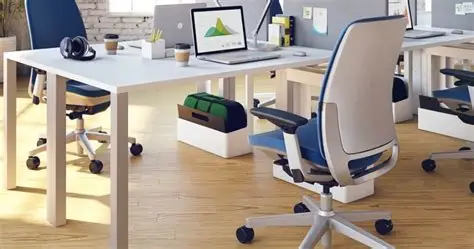
Ergonomic office chairs support healthy workdays.
In the modern workspace, where many spend hours seated at a desk, comfort and posture are no longer optional—they’re essential. Ergonomic office chairs support healthy workdays by promoting good posture, reducing strain, and enhancing overall productivity. Whether working remotely or in a corporate setting, the right chair can make a noticeable difference in how your body feels at the end of the day. More than just furniture, ergonomic chairs are investments in long-term health.

Reducing Back and Neck Strain
One of the most common complaints among desk workers is back or neck pain. This discomfort often stems from poor posture and unsupportive seating. Ergonomic chairs are specifically designed to align the spine, support the lumbar region, and prevent slouching. They usually include adjustable features such as headrests, backrests, and lumbar support cushions. By offering this tailored support, these chairs help reduce the physical strain associated with prolonged sitting.
Encouraging Better Posture
Unlike standard office chairs, ergonomic designs encourage users to sit in healthier positions. With proper seat height, armrest positioning, and back support, users are more likely to maintain natural spinal curves. This not only prevents aches and pains but also reduces long-term musculoskeletal issues. As employees become more aware of posture’s role in overall well-being, ergonomic office chairs are gaining popularity as tools for preventive care within the workplace.
Increasing Focus and Productivity
Comfort directly impacts concentration. When you’re fidgeting due to discomfort or distracted by nagging pain, your work suffers. Ergonomic office chairs support healthy workdays by enabling users to stay focused longer without the need for constant breaks or readjustments. The improved posture and circulation lead to higher energy levels and mental clarity. As a result, tasks can be completed more efficiently, benefiting both individuals and employers alike.
Customizing Comfort for Every Body
One of the key features of ergonomic chairs is adjustability. From seat depth to armrest angle, these chairs can be customized to fit various body types and preferences. This personalization helps eliminate pressure points and provides consistent support throughout the workday. Whether you’re tall, short, broad-shouldered, or petite, you can adjust an ergonomic chair to meet your unique needs—something traditional office chairs rarely offer.
Promoting Long-Term Health Benefits
Sitting improperly for years can lead to chronic pain, circulation issues, and even nerve damage. Over time, these problems can escalate into more serious health concerns. By investing in supportive seating now, you reduce your risk of future complications. Ergonomic office chairs support healthy workdays, but they also contribute to better health outcomes over the long term. They represent a proactive step toward a healthier, more sustainable work routine.
Supporting a Modern Work Environment
As businesses shift toward more health-conscious workplaces, ergonomic office furniture has become a standard rather than a luxury. Offering ergonomic chairs to employees not only improves comfort but also shows that a company values their well-being. For remote workers, bringing one home can transform a basic home office into a space that fosters productivity and health. In both cases, the chair becomes a symbol of intentional, mindful work culture.







